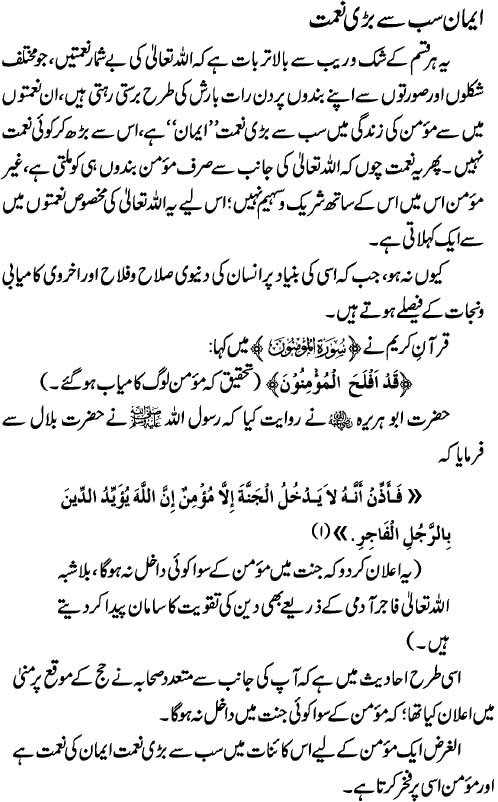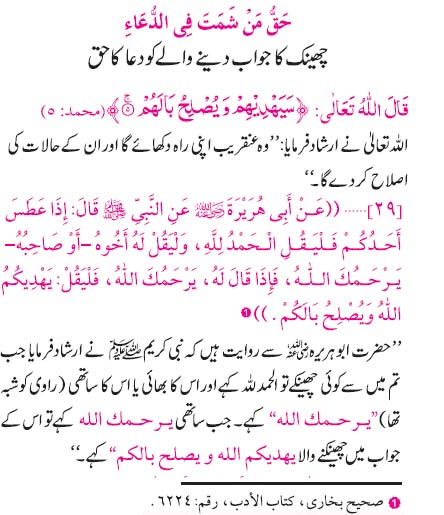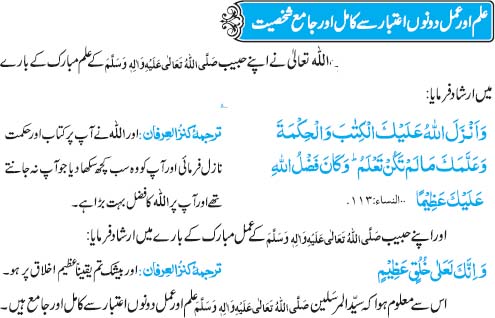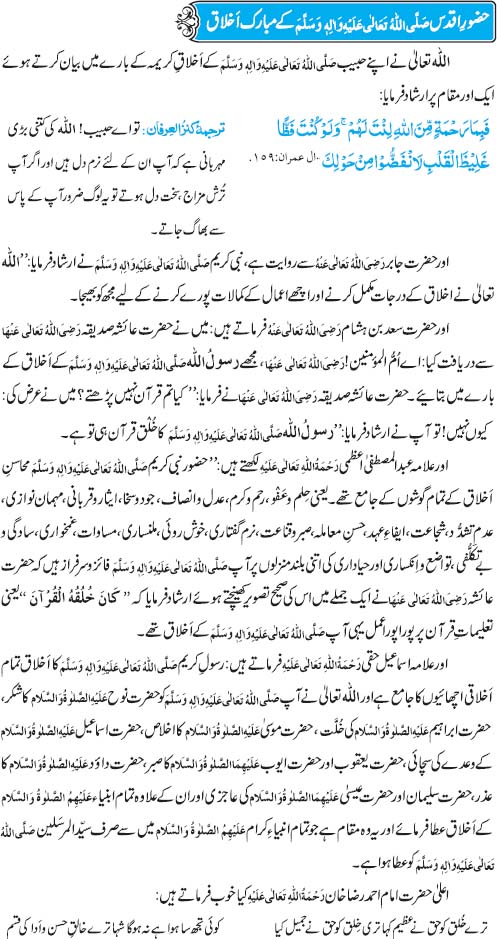
Iman Sab Say Bari Naimat
Keep Up Prayer And Enjoin The Good And Forbid The Evil
Luqman (alaihi salaam) instructions to his Son: “O My Son! Keep up Prayer And Enjoin The Good And Forbid The Evil, And Bear Patiently That Which Befalls You; Surely These Acts Require Courage”. 31. Surah Luqman: Ayah 17
Narrated by Abu Huraira (Radi Allah Anhu) Allah’s Apostle (sal-allahu-alleihi-wasallam) Said: “The Congregational Prayer Of Anyone Amongst You is More Than Twenty (five or twenty-seven) times in reward Than His Prayer in The market or in his House, for if he performs ablution completely and then goes to the mosque with the sole intention of performing the prayer, and nothing urges him to proceed to the mosque except the prayer, then, on every step which he takes towards the mosque, he will be raised one degree or one of his sins will be forgiven. The angels will keep on asking Allah’s forgiveness and blessings for every one of you so long as he keeps sitting at his praying place. The angels will say, ‘O Allah, bless him! O Allah, be merciful to him!’ as long as he does not do Hadath or a thing which gives trouble to the other.” The Prophet further said, “One is regarded in prayer so long as one is waiting for the prayer.” Sahih Al-Bukhari: Volume 3, Book 34 Sales and Trade , Number 330
Qualities of those who keep Prayers
Surely man is created of a hasty temperament. 70. Surah Al-Ma’arij : Ayah 19
Being greatly grieved when evil afflicts him. 70. Surah Al-Ma’arij : Ayah 20
And niggardly when good befalls him. 70. Surah Al-Ma’arij : Ayah 21
Except Those Who Pray. 70. Surah Al-Ma’arij : Ayah 22
Those Who Are Constant At Their Prayer. 70. Surah Al-Ma’arij : Ayah 23
And Those in Whose Wealth There is A Fixed Portion. 70. Surah Al-Ma’arij : Ayah 24
For Him Who Begs And For Him Who is Denied (good). 70. Surah Al-Ma’arij : Ayah 25
Call Upon Me, I Will Answer You; Surely Those Who Are Too Proud For My Service Shall Soon Enter Hell Abased.40. Surah Momin: Ayah 60
It is Narrated On The Authority Of Abu Huraira (Radi Allah Anhu) That:” When The Son Of Adam Recites The Ayat Of Sajdah (Prostration) And Then Falls Down in Prostration, The Satan Goes into Seclusion And Weeps And Says: Alas, And in The Narration Of Abu Kuraib The Words Are: Woe Unto Me, The Son Of Adam Was Commanded To Prostrate, And He Prostrated And Paradise Was Entitled To Him And I Was Commanded To Prostrate, But I Refused And Am Doomed To Hell.” Sahih Muslim : Book 1 Kitab Al-Iman, Number 144
It is Narrated On The Authority Of Jabir (Radi Allah Anhu) That He Heard The Apostle (may peace and blessings be upon him) Saying ” Verily Between Man And Between Polytheism And Unbelief is The Negligence Of Prayer.” Sahih Muslim : Book 1 Kitab Al-Iman, Number 146
Best Deed
It is Narrated On The Authority Of ‘Abdullah b. Mas’ud (Radi Allah Anhu) That He Observed. I Asked The Messenger Of Allah (Sallalahu Allaihi wasallam) Which Deed Was The Best. He (the Holy Prophet) Replied: Prayer At its Appointed Hour.
I (again) said: Then what?
He (the Holy Prophet) Replied: Kindness to the parents.
I (again) said: Then what?
He replied: Earnest endeavor (Jihad) in the cause of Allah.
And I would have not ceased asking more questions but out of regard (for his feelings). Sahih Muslim : Book 1 Kitab Al-Iman, Number 151
It is reported on the authority of ‘Abdullah (Radi Allah Anhu) that the Apostle of Allah (sal-allahu-alleihi-wasallam) observed: “The best of’ the deeds or deed is the (observance of) prayer at its proper time and kindness to the parents.” Sahih Muslim : Book 1 Kitab Al-Iman, Number 155
Cheenk Ka Jawab Denay Wale Ko Dua Ka Haq

Cheenk Ka Jawab Denay Wale Ko Dua Ka Haq
Visiting The Prophet’s Mosque
Located 275 miles north of Makkah, in this historic city is the Prophet’s Mosque. The Messenger of Allah (peace be upon him), said: “A Muslim should only set out (i.e. traveling with the intention of worship) for three mosques: The Holy Mosque (in Makkah), this Mosque of Mine and AI-Aqsa Mosque (in Jerusalem).”
Visiting Madina Al-Munawwarah and the Prophet’s Mosque is a Sunnah and may be performed before or after Haj.
Having been reassured about his place of residence and belongings, it is advisable for the visitor to wash his body, use perfumes, put on his best clothes, and proceed to the Prophet’s Mosque, entering with his right foot first while uttering:
“In the Name of Allah and peace be upon the Messenger of Allah. I seek refuge in Allah Almighty and in His noble countenance and His eternal power from Satan the Rejected.” “O Allah, open to me the doors of Your Mercy.”
The visitor then heads to the sanctified Rawdah (Garden) of the Prophet, situated between the Prophet’s grave and pulpit. He performs the two Raka’hs of “Tahiyyat AI-Masjid,” i.e. greeting to the Mosque. He then offers whatever supplications he wishes. The Messenger of Allah, (peace be upon him) said: “There is a garden in paradise situated between my grave and my pulpit.”
The visitor then proceeds towards the Prophet’s grave stopping three to four cubits away. He should not touch, kiss, or circle the apartment containing the Prophet’s grave.
The visitor should utter in a low voice: “Greetings be to Allah’s Messenger, Allah’s Mercy, and blessings be upon you.” Greetings be to Allah’s Prophet. Prayers and peace be on thee the best of Allah’s creation. Prayers and peace be on the leader of Messengers and Imam of the pious. I bear witness that you communicated the message, fulfilled the mission entrusted to you, sincerely advised the Ummah (Islamic nation) and you truly struggled in the way of Allah.”
Then he moves about one cubit to his right side to face the grave of Abu Bakr Al Siddeeq (may Allah be pleased with him) and says:
“Greetings and peace be upon you, successor of the Messenger of Allah. Greetings to you, the companion of the Messenger of Allah in the cave (Al-Ghar).” “Greetings to you the companion of his travels. Peace be upon you his confidant. May Allah Grant you the best reward granted to a leader for the services he has rendered for the Ummah of His Prophet.”
Then he moves about one cubit towards the grave of Umar Ibn Al-Khattab (may Allah be pleased with him) and says: “Greetings be to you Emir of the Faithful. Greetings be to you who demolished the idols. May Allah grant you the best reward for the great services you have rendered to us (Muslims).”
Then he turns toward Qiblah and prays for himself, his parents, and all those who asked to be remembered there.
– From the book “At the Service of Allah’s Guests” by the Ministry of Information, Saudi Arabia.
Ilm Aur Amal Dono Aitbaar Say Kamil Aur Jamia Shakhsiyat

Ilm Aur Amal Dono Aitbaar Say Kamil Aur Jamia Shakhsiyat
Argument About Jesus
In the name of God, the Lord of Grace, the Ever Merciful
Whenever the son of Mary is cited as an example, your people raise an outcry, saying: ‘Who is better: Our deities or he?’ They cite him only to challenge you. They are contentious people. He was but a servant of Ours whom We had favored and made an example to the Children of Israel. (Gold; Al-Zukhruf: 43: 57-59)
These verses begin the final passage of this surah, which picks up the legends the pagan Arabs weaved around their worship of angels. It refers to one of the arguments they used to defend their absurd beliefs. It was a futile argument that reflected no attempt to arrive at the truth; it was more an exercise in polemics. They had been told that both they and what they worshipped were bound for hell. The reference here is to their idols that were first intended as representations of angels, but which were later worshipped as deities. They were told that whoever worshipped anything other than God would be in hell together with the thing worshipped. In response, some of them cited the example of Jesus (peace be upon him), who was worshipped by some of those who deviated from true Christianity. They asked whether Jesus would also be in hell? This was nothing but an idle argument. They also claimed that they were better guided than the Christians who worshipped Jesus, a human being, while they worshipped the angels, God’s daughters. All this was no more than compounded falsehood. In connection with this, the surah gives an account of Jesus, explaining the truth about him and his message, and the differences that gripped his people both before and after him.
Addressing all those who deviate from their true faith, the surah warns them against the sudden coming of the Last Hour. It moves on to portray a long scene of the Day of Judgment, giving an image of lasting happiness for the God-fearing and one of painful suffering for the guilty. Furthermore, the surah negates their legends concerning the angels, makes it clear that God is free of all that they allege concerning Him, and outlines some of His attributes, including His complete ownership of both this life and the life to come. The surah concludes with a directive to the Prophet (peace be upon him) to be forbearing and to turn away from the unbelievers. They will come to know what is there to be known. This is an implicit warning to those who continue to argue after things have been made very clear.
In his biography of the Prophet (peace be upon him), Ibn Ishaq gives the following report: The Prophet sat with Al-Waleed ibn Al-Mugheerah in the Sacred Mosque, and they were joined by Al-Nadr ibn Al-Harith. There were a few other men from the Quraysh. The Prophet spoke to them, but Al-Nadr interrupted him. The Prophet argued with him until he silenced him. He then read to them a passage of the Qur’an that included the verse that says: “You and all that you were wont to worship instead of God are but the fuel of hell: that is what you are destined for.” (21: 98) The Prophet then left.
Then came Abdullah ibn Al-Zibaari of the Tameem tribe who sat with them. Al-Waleed said to him: Al-Nadr was no match for Muhammad. Indeed Muhammad said that both we and the deities we worship will be the fuel of hell. Ibn Al-Zibaari said: “Had I been the one who argued with him I would have won. Ask Muhammad whether everyone worshipped other than God will be in hell together with those worshipping him. Well, we worship the angels, and the Jews worship Ezra, while the Christians worship Jesus, son of Mary.” Al-Waleed and those who were in the Mosque admired what Ibn Al-Zibaari had said and felt that he had put forward a winning argument. When this was mentioned to the Prophet, he said: “Anyone who likes to be worshipped in place of God will be joined to those who worship him. These people only worship Satan and whoever Satan orders them to worship.” God then revealed the verse that says: “But those for whom (the decree of) ultimate good has already gone forth from Us will be kept far away from that hell.” (21: 101) This means that Jesus, Ezra, and other rabbis and priests who were sincere in their faith but were then worshipped as deities by later people will be safe from hell. Furthermore, concerning the argument about Jesus being worshipped and the admiration of the argument by Al-Waleed ibn Al-Mughirah and others, God revealed the verse that says: “Whenever the son of Mary is cited as an example, your people raise an outcry.”
In Al-Kashshaf, a commentary on the Qur’an, Al-Zamkhshari gives a largely similar report, without mentioning its source. Both reports show clearly how argumentative the pagan Arabs were. They were exactly as the Qur’an describes them: “They are contentious people.” They were certainly skillful in dispute. They realized what the Qur’an and the Prophet meant, but they tried hard to twist its meaning, indulged in polemics, exploiting the fact that the Qur’anic statement was general in its implication. This is characteristic of everyone who is devoid of sincerity, seeking to manipulate words and phrases in order to twist what was a clear meaning. Therefore, the Prophet strictly prohibited contentious arguments. Abu Umamah, a companion of the Prophet, reports: “The Prophet came out once only to find some people involved in an argument concerning the Qur’an. He was so angry that he looked as though vinegar had been poured over his face. He then said to them: ‘Do not argue about God’s book citing parts of it against other parts. No community strays into error unless they are given to contentious argument.’ He then quoted the Qur’anic verse that says: ‘They cite him only to challenge you. They are contentious people.’
Mazooron Ke Huqooq Ka Tahafuz

Mazooron Ke Huqooq Ka Tahafuz
The Blessings Of Saying Bismillah-ir-Rahman-ir-Rahim
There are many blessings and virtues of saying “Bismillah-ir-Rahman-ir-Rahim”. The following provides some of them from the Quran and hadith.
Bismillah – The First Verse of the Quran (Mushaf)
“Bismillah-ir-Rahman-ir-Rahim” is the first verse of the first chapter (Surah Al-Fatihah) of the Quran. The fact that the word of Allah, the Quran, starts with this first verse, alone signifies the importance of this verse and further emphasizes the need to start all our tasks in the name of Allah (God).
Amongst the many benefits that Sheikh Modudi states in hisQuranic Tafseer of this verse, here are some of them:
(Saying bismillah) allows one to restrain oneself from any misdeeds, since the habit of pronouncing the name of God is bound to make one wonder when about to commit some offense and how such an act can be reconciled with the saying of God’s holy name.
When a person begins something by pronouncing Allah’s (God’s) name (with sincerity in his heart), he will enjoy Allah’s support and succor; Allah will bless his efforts and protect him from the machinations and temptation of satan. For whenever man turns to Allah (God), Allah turns to him as well.
Starting with Bismillah
(In the name of Allah, the Most Gracious, the Most Merciful.)
When one says “Bismillaah” before starting anything, it means, “I start this action accompanied by the name of Allah or seeking help through the name of Allah, seeking blessing thereby. Allah is God, the beloved and worshipped, to Whom hearts turn in love, veneration, and obedience (worship). He is al-Rahman (the Most Gracious) Whose attribute is vast mercy; and al-Raheem (the Most Merciful)Who causes that mercy to reach His creation.” (Sheikh Muhammed Salih Al-Munajjid)
Hence this name (al-Rahmaan) often appears after the name Allah, as in the Qur’anic verse below:
“Say (O Muhammad): Invoke Allah or invoke the Most Gracious [al-Rahmaan] (Allah)” [Quran, Surah al-Isra’ 17:110]
Ibn Jareer (may Allah have mercy on him) said: “Allah, may He be exalted and His name sanctified, taught His Prophet Muhammad (S.A.W.S.) proper manners by teaching him to mention His most beautiful names before all his actions. He commanded him to mention these attributes before starting to do anything and made what He taught him a way for all people to follow before starting anything, words to be written at the beginning of their letters and books. The apparent meaning of these words indicates exactly what is meant by them, and it does not need to be spelled out.”
First Revelation of the Quran (“Read in the name of your lord”)
We also observe that the first verse revealed to the prophet(S.A.W.S.) was “Iqra’ bismi Rabbika” (Read(or recite) in the name of your Lord – [Surah al-‘Alaq 96:1). The verse commands the prophet (S.A.W.S.) to read “in the name of Allah).
Bismillah in Other Chapters of the Quran
With the exception of Surah At-Tawbah (9), all Surahs (chapters)start with Bismillah. Furthermore, Surah An-Naml in the Quran has another verse(number 30) that mentions Bismillah. The Quran states:
(29) She (Sheba / Saba) said: “O chiefs! Verily! Here is delivered to me a noble letter,
(30) “Verily! It is from (Prophet) Sulaiman (Solomon), and verily! It (reads): In the Name of Allah, the Most Beneficent, the MostMerciful;
Quran, Surah An-Naml (27:29-30)
The Story of ‘Bismillah’ and the hairdresser of the pharaoh’s daughter and her children
It was narrated that Ibn ‘Abbaas (may Allah be pleased with him) said: The Messenger of Allah (peace and blessings of Allah be upon him) said: “On the night on which I was taken on the Night Journey(Isra’), a beautiful fragrance came to me. I said: O Jibreel, what is this beautiful fragrance? He said: This is the fragrance of the hairdresser of Pharaoh’s daughter and her children. I said: What is their story? He said: Whilst she was combing the hair of Pharaoh’s daughter one day, the iron comb fell from her hand and she said, ‘Bismillaah (in the name of Allah).’ The daughter of Pharaoh said: ‘My father?’ She said:‘No. My Lord and the Lord of your father is Allah.’She said: ‘I will tell him about that.’ She said:‘Yes.’ So she told him and he summoned her and said: ‘O So and so, do you have a Lord other than me?’ She said: ‘Yes, my Lord, and your Lord is Allah.’ He ordered that a Baqarah(lit. “cow”) made of copper be heated up, and then he ordered that she and her children be thrown into it. She said: ‘I have a request to make of you.’ He said: ‘What is your request?’ She said: ‘I would like my bones and my children’s bones to be gathered together in one cloth and buried.’ He said: ‘This will be done for you.’ He ordered that her children be thrown into it in front of her, one by one, until they came to the last one who was an infant boy who was still being breastfed. It was as if she wavered because of him, but he said: ‘O mother, go ahead, for the punishment of this world is easier to bear than the punishment of the hereafter.’ So she went ahead.” Ibn ‘Abbaas(may Allah be pleased with him) said: Four infants spoke: ‘Eesa ibn Maryam (peace be upon him), the companion of Jurayj, the witness of Yoosuf and the son of the hairdresser of Pharaoh’s daughter.
Narrated by Imam Ahmad in al-Musnad (1/309),al-Tabaraani (12280), Ibn Hibbaan (2903), and al-Haakim (2/496).
The Guidance to say Bismillah according to Hadith
We also observe that the prophet (S.A.W.S.) taught us to say bismillah at the start of many tasks such as the following:
BISMILLAH AT THE BEGINNING OF ABLUTION (WUDU)
Bismillah is recommended at the beginning of ablution, for Imam Ahmad and the Sunan compilers recorded that Abu Hurayrah, Sa’id bin Zayd, and Abu Sa’id narrated from the Prophet (There is no valid ablution for he who did not mention Allah’s Name in it.) This Hadith is Hasan (good).
SAYING BISMILLAH BEFORE EATING AND DRINKING
Also, the Bismillah is recommended before eating, for Muslim recorded in his Sahih that the Messenger of Allah said to `Umar bin Abi Salamahwhile he was a child under his care, (Say Bismillah, eat with your right hand and eat from whatever is next to you.)
Some of the scholars stated that Bismillah before eating is obligatory.
The Prophet (S.A.W.S.) said: “When one of you eats some food, let him say Bismillah, and if he forgets to do so at the beginning, let him say Bismillah fi awwalihi wa aakhirihi (In the name of Allah at the beginning and end). Narrated by at-Tirmidhi, 1781; classed as saheeh by Shaykh al-Albaani (may Allah have mercy on him).
BISMILLAH FOR BELITTLING THE SHAYTAN(SATAN)
Imam Ahmad recorded in his Musnad, that a person who was riding behind the Prophet (S.A.W.S.) said, “The Prophet’s animal tripped, so I said, `Cursed Shaytan.’ The Prophet said, (Do not say, ‘Cursed Shaytan,’ for if you say these words, Satan becomes arrogant and says, ‘With my strength, I made him fall.’ When you say, ‘Bismillah,’ Satan will become as small as a fly.)
HALAL MEAT
Allah says in the Quran: “Eat not (O believers) of that (meat) on which Allah’s Name has not been pronounced (at the time of the slaughtering of the animal)” Quran (Surah Al-Anaam, 6:121)
And the Prophet (S.A.W.S.) said: “If the blood (of the slaughtered animal) flows and the name of Allah is mentioned, then eat.”
PERFORMING RUQYAH
The Prophet (S.A.W.S.) said, “There is no ruqyah(treatment from evils) except in the case of the evil eye or fever.”(al-Tirmidhi, Abu Dawood.) Angel Jibril (peace be upon him) used to do ruqyah for the Prophet (S.A.W.S.) and say, “Bismillahi arqeeka minkulli shayin yudheeka, min sharri kulli nafsin aw ‘aynin hasid Allaahuyashfeek, bismillahi arqeek (In the name of Allah I perform ruqyah for you, from everything that is harming you, from the evil of every soul or envious eye may Allah heal you, in the name of Allah I perform ruqyah for you).”
Conclusion
Let’s make it a point to bring “Bismillah” more into our lives and to start all our tasks in the name of Allah by saying “Bismillah-ir-Rahman-ir-Rahim”
Courtesy: IqraSense
Huzoor-e-Aqdas (Sallallahu Alaihi Wasallam) Kay Mubarak Ikhlaq

Huzoor-e-Aqdas (Sallallahu Alaihi Wasallam) Kay Mubarak Ikhlaq
Eat And Spend From Good (Alttayyibat)
[Sahih Muslim: Book 5 Kitab Al-Zakat, Number 2214] Abu Huraira (Radi Allah Anhu) reported Allah’s Messenger (sal-allahu-alleihi-wasallam) as saying: O people, Allah is Good and He therefore, accepts only that which is good. And Allah commanded the believers as He commanded the Messengers by saying:” O Messengers, eat of the good things, and do good deeds; verily I am aware of what you do”. And He said: ‘ O those who believe, eat of the good things that We gave you” He then made a mention of a person who travels widely, his hair disheveled and covered with dust. He lifts his hand towards the sky (and thus makes the supplication):” O Lord,0 Lord,” whereas his diet is unlawful, his drink is unlawful, and his clothes are unlawful and his nourishment is unlawful. How can then his supplication be accepted?
[Sahih Muslim: Book 5 Kitab Al-Zakat, Number 2211] Abu Huraira (Radi Allah Anhu) reported Allah’s Messenger (sal-allahu-alleihi-wasallam) as saying: If anyone gives as Sadaqa the equivalent of a date from that (earning) earned honestly, for Allah accepts that which is lawful, the Lord would accept it with His Right Hand, and even if it is a date, it would foster in the Hand of the lord, as one of you fosters his colt, till it becomes bigger than a mountain.
[2. Surah Al-Baqarah : Ayah 267] O you who believe! spend (benevolently) of the good things that you earn and or what We have brought forth for you out of the earth, and do not aim at what is bad that you may spend (in alms) of it, while you would not take it yourselves unless you have its price lowered, and know that Allah is Self-sufficient, Praiseworthy.
[2. Surah Al-Baqarah: Ayah 268] Shaitan threatens you with poverty and enjoins you to be niggardly, and Allah promises you forgiveness from Himself and abundance; and Allah is Ample-giving, Knowing.
Our Lord! grant us good in this world and good in the hereafter, and save us from the chastisement of the fire.

